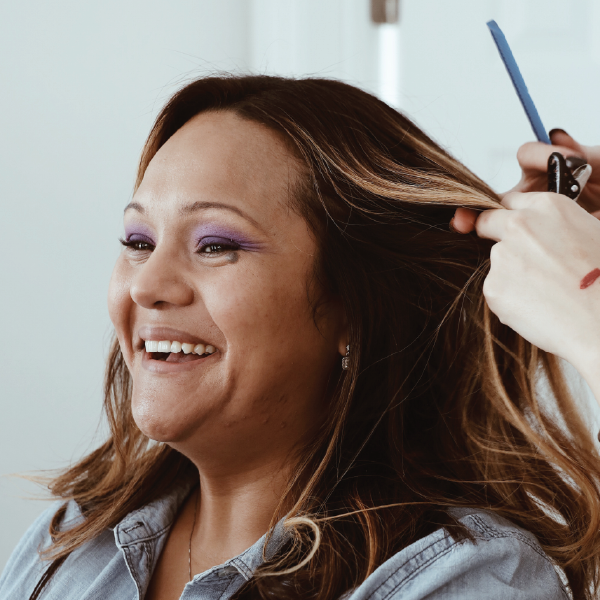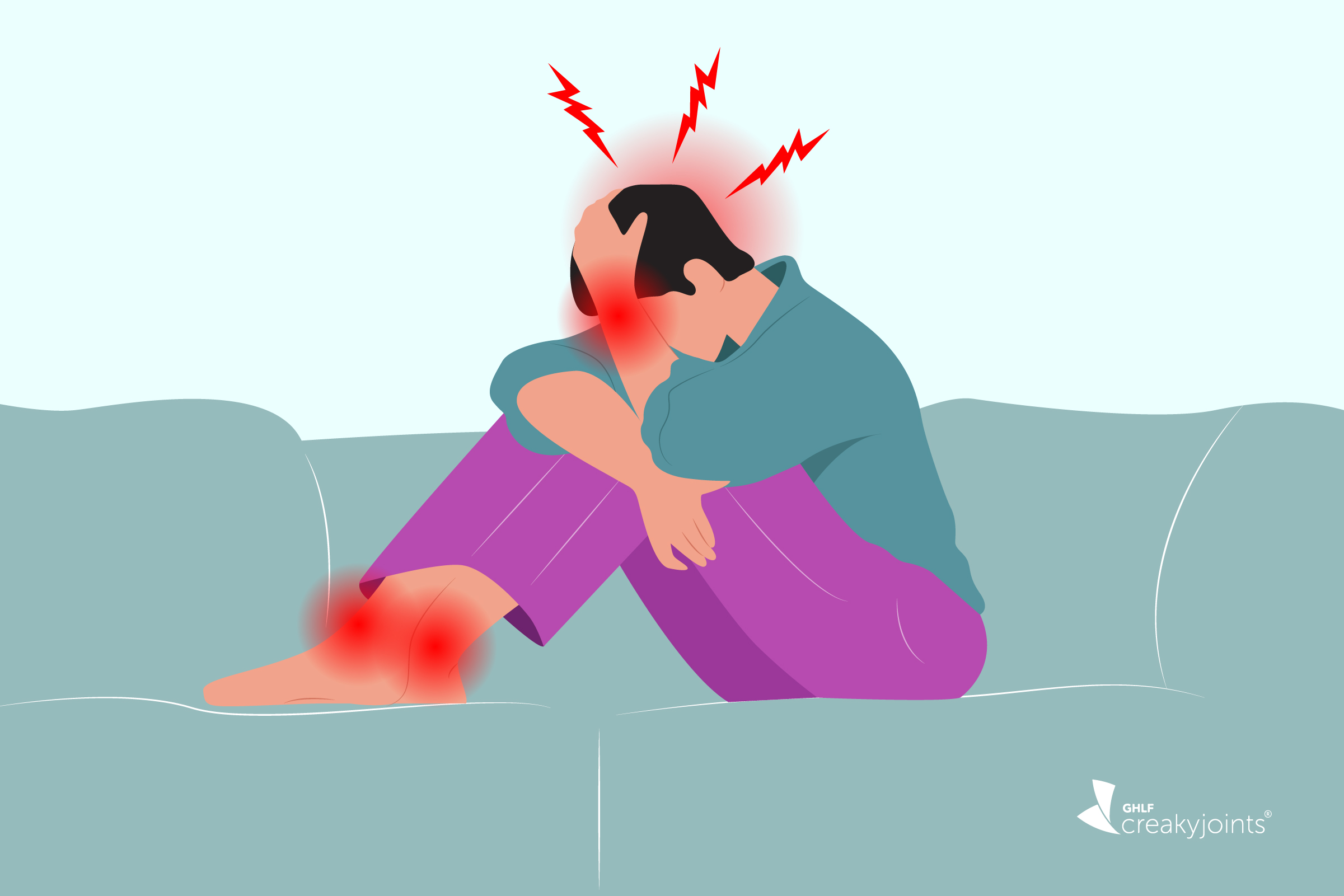We asked students with chronic illness what helped them in their journey.
Here’s What Our Patients Want Their Stylists to Know: Empathy and Care at the Salon
Here’s What Our Patients Want Their Stylists to Know: Empathy and Care at the Salon
July 7, 2023
Bowei Li

An easily overlooked aspect of chronic illness care is a patient’s experience at the salon. Whether it’s having someone else wash and touch your hair and scalp, sitting for long periods of time, or the stimulus of constant chatter, hair dryers, and bright lights, getting a haircut can be uncomfortable and stressful for many.
As part of GHLF’s new program HEROES (Health Education, Reliable Outreach, Empathetic Support), a free educational initiative for salon and beauty professionals aimed at improving care for clients with chronic skin conditions, we reached out to our CreakyJoints and GHLF community. We wanted to know what they wished their stylists understood about living with a chronic illness. The responses ranged from suggestions for making the visit more physically comfortable to addressing their emotional needs.
Here, we share what your patient peers want their stylists to know to improve their salon experience.
Use extra caution and care when treating the hair, head, neck, and shoulders — these are sensitive body parts that can easily hurt or be damaged.
“I remind people to use a neck rest at the sink, because it’s painful to get my hair washed and, depending on the basin and chair, some can cause a lot of pain. Also, no aggressive hair washing where I feel like my head/neck are being pulled forcefully.” — @_kirstina.ht_
“Extra product on the wash/conditioner makes the hands go through the hair easier and makes for less pull.” — @shazzy_renee
“My hair stylist knows about my chronic conditions, but I don’t know that I’ve ever really told her how much it takes out of me/how triggering a haircut really is. I occasionally go in with my hair already washed and always skip having her dry it, so I think she probably has some idea.” — @migrainechat
“Please, please, PLEASSSSEEEEE, for the love of God, be gentle with my head, neck, and shoulders. I can’t take all that pulling, pushing, shoving, etc. I know you have another head to get to but please don’t take mine off.” — @technette
“I have temporal arteritis, which makes my head incredible sore… please ask what pressure I prefer before washing my hair.” — @binduyoga.au
“I often remind [my nail tech] to go easy on my fingers since most of them are already deformed and kind of painful.” — @letiwa_maiyan
“It hurts my neck and shoulder to wash my hair.” — @rachelolyott
“Knowing that my scalp is super sensitive since having to go back to chemo. Also, heat sets off POTS [postural orthostatic tachycardia syndrome] symptoms for me, so please go cooler on the heat settings.” — @thebumblebeehive
“That sometimes my head and the side of my face is in agony.” — @two_crazy_cockers
“I can’t move my neck much — very poor range of motion.” — Tiffany Marie Armstrong
“Head massages are the best treat ever.” — Rene Schreuder
Be patient — we might have to cancel appointments more often or take a break or two throughout a visit.
“My stylist/loctitian understands I may need to cancel more often (if I do this, I’ll pay in advance so she’s not feeling that ding), take more breaks to stretch/stand. She has a home salon, which helps a lot. I don’t feel on display or that I have to put on any airs. We have good communication and are both flexible, which is key.” — @chronicinbklyn
“If the appointment is over 30 minutes I may need to get up and move around to stretch and change positions.” — @lavieajasmine
“I may have to cancel/reschedule an appointment but eventually I’ll get there.” — Anne Mcmahon
“That I left a hairdresser I loved because I couldn’t fit into/be comfortable in their chair.” —@eligrrrl
Salons are already stimulating, so if we’re quiet, it doesn’t mean we don’t appreciate the service.
“My stylist needs to know that sometimes showing up and having all the stimulation of a salon (smells, lights, sounds, being touched) is all I can handle. Sometimes I am not able to handle the stimulation and have a conversation at the same time. I don’t want her to think I am being rude by not talking much, or by having earplugs in. I appreciate her so much and really wish I could have engaging convos like everyone else.” — @spookynonbinary
“I talk to them in advance to book a less busy salon time, and if I want to do something exciting to my hair, I discuss how easy the day-to-day management of that would be in reality.” — @imaginarycupcakes
Nothing beats a stylist who understands our experience with chronic illness. Empathy can go a long way toward making us feel respected, understood, and cared for.
“My hair stylist and I both have RA so we just share warrior stories. It’s wonderfully therapeutic for us both.” —@sfccreativeworks
“Mine has known from the beginning of my health issues, so when I started losing my hair, she was a big help. After three years, it’s finally starting to come back in, and just her insight and encouragement have been awesome.” — @sheyhouston
“Mine is fantastic. I am not the only client she has with RA so she gets it.” — Judy Ferril
“Mine is awesome too. She has suggestions for styling tools that help a lot. She also makes sure I’m comfortable.” — De Light Massey
“My stylist is wonderful and knows I need to move and stretch and sometimes can’t do a longer appointments.” — @keltokel
Join GHLF’s HEROES Program
GHLF invites you to make a difference in your community with our unique program called HEROES (Health Education + Reliable Outreach + Empathetic Support). HEROES is a FREE education and outreach initiative that equips beauty professionals to better support clients living with scalp and other skin conditions and offers people living with skin and scalp conditions helpful resources and information on getting a proper diagnosis, managing symptoms, and becoming an empowered patient. To learn more, visit GHLF.org/HEROES today.
SUBSCRIBE TO GHLF
RELATED POST AND PAGES
_
Was this article helpful?
YesNo







